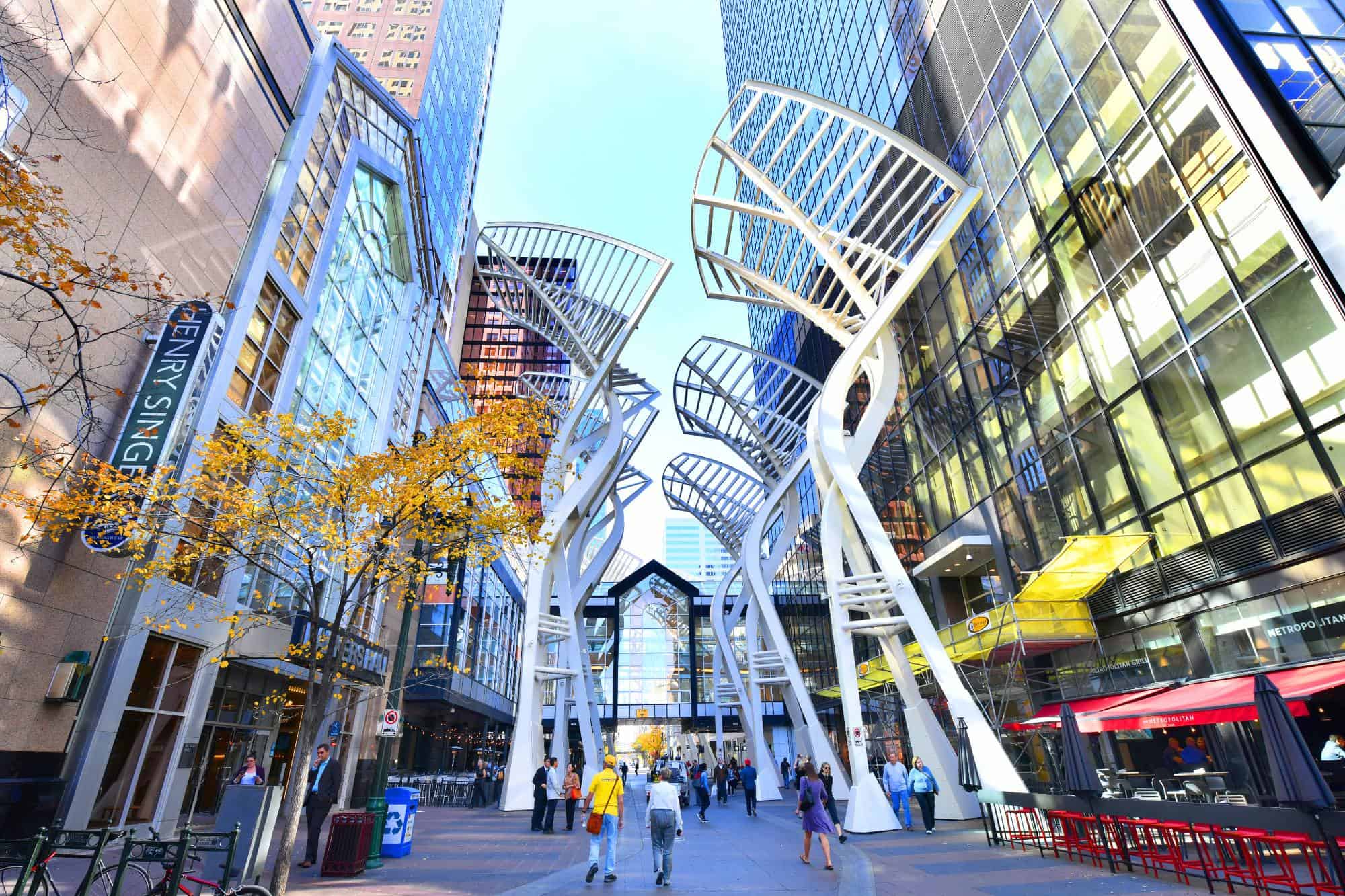As the two largest cities in Alberta, Edmonton and Calgary have long been locked in a friendly rivalry. But when it comes to choosing the best place to call home, which city truly takes the crown?
This age-old debate has thrived among Albertans and newcomers alike, with each city boasting its unique character and advantages. Whether you're drawn to Calgary's gleaming skyscrapers and proximity to the Rocky Mountains or Edmonton's creative arts scene and river valley oasis, the decision between these Canadian powerhouses is far from simple.
Our comprehensive comparison will explore Alberta's metropolises, examining everything from job markets and housing costs to lifestyle perks and climate considerations.
Secure Peace of Mind with Best-Value International Health Coverage
International Citizens Insurance provide free, no-obligation quotes from the leading international health insurance providers with plans tailored to meet your needs. Trusted by thousands of expats worldwide.
When you’re done reading, you'll have a clear picture of what sets Edmonton and Calgary apart and which city might be the perfect fit for you.
Your ideal home location ultimately depends on what you want or need; we’ll touch on all the factors that may be your make-or-break priority list. We'll examine the economic landscapes that shape each city's opportunities, compare the cost of living, and delve into the cultural fabric that gives each city its distinct character.
Whether you're a young professional seeking career advancement, a family looking for the ideal place to put down roots, or a retiree searching for the perfect balance of amenities and homeliness, our guide will help you to make a more informed decision.
Choosing between Edmonton and Calgary is about selecting the backdrop for your lifestyle and the community that will play a significant role in your future experiences. So, let's peel back the layers of these Albertan giants and discover which city might be your perfect match in the great Edmonton vs Calgary showdown.
Demographic and economic comparison
Our Edmonton and Calgary comparison starts with their demographic makeup and economic landscapes, key factors that play a crucial role in shaping each city's overall living experience.
Edmonton, the capital city of Alberta, boasts a current metro area population of approximately 1,568,000 as of 2024. Known as the "Gateway to the North," it attracts a diverse mix of newcomers, including a significant number of young professionals and families. The city's demographic profile is characterized by a median age of 38.4 years, indicating a relatively young population.
Calgary is the largest city in Alberta, with a population of 1,665,023 as of 2024. Often referred to as "Cowtown" due to its western heritage, Calgary also has a relatively young median age of 38.8 years. The city has seen substantial growth in recent years, attracting both domestic and international migrants.

Both cities boast a multicultural population with a diverse range of ethnicities and cultures. However, Calgary tends to have a higher immigrant proportion, accounting for about 30% of its population, compared to Edmonton's 24%.
Both cities' diversity contributes to their extensive cultural scenes, which offer residents a vast range of culinary experiences, festivals, and community events.
For a detailed overview of Alberta and what it offers, visit our Living In Alberta guide.
Calgary vs. Edmonton economy
When it comes to economic comparison, both Calgary and Edmonton have their strengths and unique economic drivers. Calgary has long been known as the heart of Canada's oil and gas industry, while Edmonton's economy is more diversified, with a strong public sector presence.
Calgary's economy is primarily driven by:
- Energy sector (oil and gas)
- Financial services
- Technology and innovation
- Transportation and logistics
- Tourism
Edmonton's economic pillars include:
- Government and public administration
- Healthcare and education
- Energy and natural resources
- Manufacturing and construction
- Retail and services
Calgary has traditionally enjoyed a slightly higher median household income, with figures around $128,800 compared to Edmonton's $124,900. This difference can be attributed to the concentration of high-paying jobs in Calgary's energy and financial sectors. However, it's worth noting that this gap has been narrowing in recent years as Edmonton's economy continues to diversify and grow.
Unemployment rates have fluctuated in both cities. Calgary is significantly influenced by the volatility of the oil and gas industry.
Edmonton's current unemployment rate (2024) stands at 7.1%, while Calgary's is slightly higher at 8.5%. These figures reflect both cities' ongoing economic challenges, particularly in the wake of global oil price fluctuations and recovery from the COVID-19 pandemic.
Despite these challenges, both cities have been actively working to diversify their economies and attract new industries. Calgary has been making strides in the tech sector, with initiatives like the Calgary Innovation Coalition aiming to foster startup growth. Edmonton, meanwhile, has been leveraging its strengths in artificial intelligence and machine learning, with the University of Alberta playing a key role in research and development.
In conclusion, while Calgary has a slight edge in terms of median income, Edmonton's more diversified economy provides a slightly higher degree of stability. Both cities offer ample career growth and entrepreneurship opportunities, making them attractive destinations for professionals and businesses alike.
Housing and living costs
Deciding whether Edmonton or Calgary is your best choice often comes down to finances. The cost of housing and daily living expenses can make all the difference.
Both cities offer excellent housing options, but there are notable differences in pricing and affordability.
Calgary's average home price is $623,245, up 13% year over year. These figures indicate a strong demand for housing in Calgary, which can be both an opportunity for investment and a challenge for first-time homebuyers.
In contrast, Edmonton generally offers more affordable housing options, with Edmonton's average house price at a much more affordable $441,350. This significant difference of over $180,000 in average home prices can be a decisive factor for many individuals and families considering a move to either city. Edmonton's lower housing costs provide far greater opportunities for homeownership, especially for those entering the real estate market for the first time.
For investors or buyers with larger budgets, it’s important to consider that while Calgary's housing market is more expensive, it may also offer potentially higher returns on investment due to its robust economic growth and population influx. However, Edmonton's more affordable housing market can translate to lower mortgage payments and reduced financial stress for homeowners.
Utilities, groceries, and more
Beyond housing costs, daily living expenses are important in determining a city's overall affordability. Calgary and Edmonton have similar cost structures for utilities, groceries, and other essential expenses, but some differences exist.

Utility costs in both cities are generally comparable, with slight variations depending on the specific service provider and usage patterns. However, Calgary tends to have slightly higher utility costs due to its larger population and more extensive infrastructure. This difference is often marginal and shouldn’t significantly impact overall living expenses.
Grocery prices in Calgary and Edmonton are similar, with both cities benefiting from Alberta's vital agricultural sector. However, Calgary's larger population and more diverse food scene may lead to a wider range of options, including specialty and gourmet items, potentially increasing average grocery expenses for some households.
When it comes to dining out and entertainment, Calgary’s more extensive and varied selection of restaurants, bars, and cultural venues can also lead to higher costs, especially if you frequently partake in those amenities. Edmonton, while still offering an extensive food and entertainment scene, does tend to present more budget-friendly options.
Transportation costs can also differ between the two cities:
- Public transit: Calgary's more extensive CTrain system can offer better value for commuters, while Edmonton's LRT system is still expanding.
- Fuel costs: These are similar in both cities, but Calgary's sprawling road layout may lead to higher fuel consumption for car-dependent residents.
- Parking: Downtown parking tends to be more expensive in Calgary due to higher demand and limited space.
In summary, daily living expenses are similar, with Calgary potentially having a slight edge in terms of costs due to its larger size and more diverse offerings.
Lifestyle and culture
Edmonton and Calgary’s lifestyle and culture could well be the differentiating aspects that help you decide which city is the best fit for you. Both cities have quite distinct personalities that set them apart.
Calgary, often fondly known as "Cowtown," enthusiastically embraces its authentic Western Heritage. The city's most famous event, the Calgary Stampede, is a 10-day festival celebrating cowboy culture that draws over a million visitors annually.

The Stampede epitomizes Calgary's spirit, showcasing rodeos, chuckwagon races, and country music performances. Beyond the Stampede, Calgary boasts a vibrant arts scene with numerous theaters, galleries, and museums.
Edmonton is Canada’s "Festival City" with its exciting year-round calendar of events. From the Edmonton International Fringe Theatre Festival to the Folk Music Festival, there's always something happening in Edmonton.
The city's commitment to arts and culture is evident in its thriving local music scene and the stunning Art Gallery of Alberta. Edmonton's River Valley, the largest urban park in North America, offers extensive trails for hiking, biking, and cross-country skiing, making it a paradise for outdoor enthusiasts.
Both cities take great pride in their culinary scenes, each with distinct flavors. Calgary's restaurant landscape is diverse and sophisticated, with an ever-growing number of award-winning establishments. The city's proximity to cattle country means you'll find some of the best steakhouses in Canada here. Edmonton's food scene, while no less impressive, has a more eclectic and multicultural flair, reflecting its diverse population.
When it comes to nightlife, Calgary tends to have a more upmarket feel, with swanky bars and clubs concentrated in areas like 17th Avenue and the Beltline. Edmonton's nightlife can be described as more laid-back and diverse, with popular hangouts scattered throughout Old Strathcona and downtown. The city's large student population contributes to a youthful, energetic vibe in many trendier areas.
Sports play a significant role in both cities' cultures. Calgary is home to the NHL's Flames and the Canadian Football League's Stampeders, while Edmonton boasts the Oilers (NHL) and the Elks (CFL). The rivalry between these teams adds extra excitement to the cities' sporting scenes.
Both cities offer ample shopping choices. Calgary's Core Shopping Centre and 17th Avenue combine high-end and mainstream retail experiences. Edmonton is home to North America's largest mall, West Edmonton Mall, which combines shopping with first-class entertainment, featuring an indoor waterpark, amusement park, and ice rink.

Ultimately, the choice between Calgary and Edmonton's lifestyle and culture comes from personal preference. If you're drawn to a city with an authentic Western identity, a corporate vibe, and a sophisticated culinary scene, Calgary might well be your best bet. If you prefer a more diverse cultural calendar, a relaxed atmosphere, and extensive outdoor recreational opportunities, Edmonton could be your ideal choice.
Education and healthcare services
Calgary and Edmonton have excellent educational institutions and dependable healthcare systems, but some notable differences exist.
In terms of education, Calgary and Edmonton offer a wide range of options from primary to post-secondary levels.
Calgary is home to the University of Calgary, a renowned institution consistently ranking among Canada's top universities. Edmonton, on the other hand, hosts the University of Alberta, which is often considered one of the country's leading research universities. Both cities also have additional post-secondary institutions, including colleges and technical schools, providing diverse educational opportunities for students.
The public school systems in both cities are well-regarded, with Calgary's public and Catholic school boards serving over 180,000 students. Edmonton's public and Catholic school systems are equally impressive, educating approximately 150,000 students. Both cities offer specialized programs, including French immersion, arts-focused curricula, and International Baccalaureate programs, catering to various educational needs and interests.
When it comes to healthcare, both Edmonton and Calgary are equipped with world-class facilities and services. Calgary's healthcare system is anchored by the Foothills Medical Centre, one of the largest hospitals in Canada, known for its advanced cardiac and stroke care. Edmonton's healthcare landscape is dominated by the University of Alberta Hospital, a leading center for organ transplantation and complex neurological care.
Here's a brief comparison of healthcare facilities in both cities:
Calgary:
- Foothills Medical Centre
- Peter Lougheed Centre
- Rockyview General Hospital
- South Health Campus
Edmonton
- University of Alberta Hospital
- Royal Alexandra Hospital
- Misericordia Community Hospital
- Grey Nuns Community Hospital
Both cities have made significant investments in healthcare infrastructure in recent years. Calgary opened the South Health Campus in 2013, a state-of-the-art facility serving the city's growing southern communities. Edmonton, meanwhile, has seen expansions and renovations at several of its major hospitals, enhancing capacity and improving patient care.
It's worth noting that while both cities offer excellent healthcare services, wait times can be a concern, as is common across Canada. However, both Edmonton and Calgary have implemented various initiatives to address this issue, including increased funding for primary care networks and the expansion of urgent care centers to alleviate pressure on emergency departments.
In conclusion, both Edmonton and Calgary offer high-quality options. The choice between the two may come down to specific needs or preferences, such as particular academic programs or specialized medical services.
Working in Calgary vs Edmonton
Both cities offer diverse career prospects, but differences in their economic landscapes can influence your decision.
Calgary, the heart of Canada's energy sector, has always been associated with the oil and gas industries. However, the city has been diversifying its economy with growing technology, finance, and renewable energy sectors in recent years. This shift has created a more resilient job market, offering opportunities across a broader spectrum of industries.
Edmonton has tended to have a more stable economy due to its status as the provincial capital and its strong public sector presence. The city is home to numerous government offices, educational institutions, and healthcare facilities, providing a solid foundation for secure employment. Additionally, Edmonton's economy is bolstered by industries such as construction, manufacturing, and logistics.
When it comes to salary comparisons, as mentioned, Calgary generally offers slightly higher wages across many sectors. However, it's important to note that this difference is relatively small and can vary depending on the specific industry and job role.
Here are some key factors to consider when comparing the job markets in Calgary and Edmonton:
- Industry focus: Calgary is stronger in energy, finance, and technology, while Edmonton excels in government, education, and healthcare.
- Job stability: Edmonton tends to have more stable employment due to its larger public sector presence.
- Career growth: Calgary may offer more opportunities for rapid career advancement in certain industries, particularly in the private sector.
- Networking: Both cities have active professional networks, but Calgary's business community is often perceived as more interconnected.
Ultimately, your choice between working in Calgary or Edmonton will depend on your specific career goals, industry preferences, and personal circumstances. It's advisable to research job openings in your field and potentially reach out to local recruiters to gain more insights into the current job market in both cities.
Transportation infrastructure
Both cities have invested significantly in their transportation systems, but their individual approaches and outcomes differ.
Calgary's transit system is often praised for its efficiency and forward-thinking design. The city boasts an extensive light rail transit (LRT) system known as the CTrain, which serves as the backbone of public transportation. The CTrain covers a significant portion of the city, with lines extending to the north, south, west, and northeast. This system is particularly beneficial for commuters, providing a reliable and eco-friendly alternative to driving.
In contrast, while comprehensive, Edmonton's public transit system has faced some challenges in recent years. The city's LRT system is less extensive than Calgary's. However, Edmonton has been making strides to improve and expand its transit network. The recent addition of the Valley Line Southeast LRT and ongoing plans for further extensions demonstrate the city's commitment to enhancing public transportation options.
Both cities have well-developed bus networks that complement their rail systems. Calgary's bus rapid transit (BRT) lines, known as MAX, provide efficient service along high-demand corridors. Edmonton, on the other hand, has been focusing on improving its bus network through initiatives like the Bus Network Redesign, which aims to increase service frequency and reliability.
When it comes to road infrastructure, both cities face challenges typical of fast-growing urban centers. Calgary's road network is generally considered to be more extensive and better maintained, with a well-developed system of freeways and major arterial roads. The city's new ring road, completed at the end of 2023, nearly a year ahead of schedule, has further improved traffic flow around the city.
While functional, Edmonton's road network has been criticized for its maintenance issues, particularly during harsh winter. However, the city has been investing in road improvements and expansions to address these concerns. The Anthony Henday Drive, Edmonton's ring road, is being widened from four to six lanes, significantly improving traffic circulation around the city after its full completion later this year.
For cyclists, both cities have been making efforts to improve infrastructure. Calgary has an extensive network of bike paths, particularly along its river valleys, and has been implementing protected bike lanes in the downtown core. Edmonton, while historically lagging behind in cycling infrastructure, has been rapidly catching up with the implementation of its Bike Plan, which aims to create a more connected and safer network for cyclists.

In terms of air travel, both cities are served by international airports. Calgary International Airport is larger and handles more passenger traffic, offering a wider range of domestic and international flights. Edmonton International Airport, while smaller, still provides good connectivity and has been expanding its services in recent years.
Ultimately, while both cities have their strengths and weaknesses in transportation infrastructure, Calgary generally edges out Edmonton in terms of public transit efficiency and road network quality. However, Edmonton's ongoing investments and improvements suggest that the gap may narrow in the coming years.
Climate comparisons
With Edmonton and Calgary just 175 miles apart, you’d be forgiven for thinking that climate differences shouldn’t be much of a consideration. Yet both cities experience distinct differences in their weather patterns that may make you say yes or no.
Calgary, nestled closer to the Rocky Mountains, benefits from a unique climate influenced by its elevation and proximity to the mountains. The city is known for its unpredictable weather, often experiencing rapid temperature changes within a single day.
One of Calgary's most distinctive weather features is the Chinook winds, which can bring sudden warm spells during winter months. These winds can cause temperature increases of up to 20°C in just a few hours, providing welcome relief from the winter cold.
Edmonton, on the other hand, has a more stable climate pattern. Located further north and inland, it experiences longer, colder winters and shorter summers than Calgary. The city's weather is generally more predictable, with less dramatic temperature fluctuations throughout the year. Consistent cold temperatures and more snowfall than Calgary characterize Edmonton's winters.
Here's a quick comparison of key climate factors between the two cities:
- Average annual temperature: Calgary 4.4°C, Edmonton 3.4°C
- Annual precipitation: Calgary 418.8 mm, Edmonton 455.7 mm
- Annual snowfall: Calgary 128.8 cm, Edmonton 123.5 cm
- Sunshine hours per year: Calgary 2,396, Edmonton 2,299
While these numbers might seem similar at first glance, the day-to-day experience of living in each city does feel quite different due to factors like wind patterns and humidity levels.
Calgary's climate is generally drier, which can make the cold feel less biting in winter but also increases the risk of dry, chapped skin.
Edmonton's climate, while colder on average, tends to be more humid. This can make summer days feel more comfortable while winter days feel chillier. The city also experiences longer daylight hours in summer due to its more northern latitude, which can be a significant plus for anyone who enjoys summer outdoor activities.

Both cities have unique climate peculiarities. Calgary's weather can be more unpredictable, with snow possible in just about any month of the year. The city is also prone to dramatic summer storms, including hail the size of golf balls. Edmonton, while more stable weather-wise, faces extremely no-coat-is-warm-enough cold temperatures in winter, with days or even weeks where the mercury doesn't rise above -20°C.
Ultimately, your preference between Edmonton and Calgary's climate will depend on your personal tolerance for cold, your ability to adapt to rapid weather changes, and your lifestyle preferences.
Both cities offer ample opportunities if you enjoy outdoor winter activities, but Edmonton's longer, more consistent winter might be more appealing. If you prefer milder winters with occasional unexpected warm breaks, Calgary's Chinook-influenced climate might be more to your liking.
Pros and cons of living in Calgary vs Edmonton
Let's break down the pros and cons of living in each city to help you decide.
Calgary: pros
- Economic opportunities: Calgary boasts a robust economy, particularly in the energy sector, offering numerous job opportunities and potential for career growth.
- Natural beauty: The city's proximity to the Rocky Mountains provides easy access to stunning landscapes and outdoor recreational activities.
- Lower sales tax: Alberta has no provincial sales tax, which can lead to significant savings on purchases compared to other provinces.
- Cultural diversity: Calgary's multicultural population contributes to a vibrant and diverse community, enriching the city's cultural scene.
Calgary: cons
- Cost of living: While generally more affordable than some major Canadian cities, Calgary can still be expensive, especially in terms of housing costs.
- Weather extremes: The city experiences dramatic temperature fluctuations, with frigid winters and the occasional summer heatwave.
- Urban sprawl: Calgary's rapid growth has led to significant urban sprawl, which can result in longer commute times and a car-dependent lifestyle.
- Economic volatility: The city's heavy reliance on the oil and gas industry can lead to financial instability during energy market downturns.
Edmonton: pros
- Affordability: Generally, Edmonton offers more affordable housing options compared to Calgary, making it attractive for first-time homebuyers and families.
- Green spaces: The city boasts an extensive river valley park system, providing ample opportunities for outdoor activities and recreation within the urban environment.
- Cultural scene: Edmonton is known for its arts community and hosts numerous festivals throughout the year, earning it the nickname "Festival City."
- Government hub: As the provincial capital, Edmonton offers stable government jobs and a diverse economy that is less dependent on a single industry.
Edmonton: cons
- Harsher winters: Edmonton typically experiences colder and longer winters compared to Calgary, which can be challenging if you’re unaccustomed to extreme cold.
- More limited job market: While the job market is stable, it may offer fewer opportunities in specific sectors compared to Calgary's more diverse job market.
- Distance from mountains: Unlike Calgary, Edmonton is further from the Rocky Mountains, requiring longer travel times for mountain-based activities.
- Urban aesthetics: Some find Edmonton's urban landscape less appealing than Calgary's, with fewer architectural landmarks and a less defined skyline.
It's worth noting that Calgary has been recognized for its livability on a global scale. In fact, Calgary is now ranked the 5th most livable city in the world. This accolade speaks volumes about the quality of life Calgary offers, but it doesn't necessarily mean it's the perfect fit for everyone.
Conclusion: making the choice that's right for you
Deciding between Calgary and Edmonton as your future home is a significant decision that requires careful consideration. Let’s recap the main highlights.
Calgary, with its robust economy, proximity to the Rocky Mountains, and thrilling cultural scene, may appeal if you’re seeking a dynamic urban environment with ample outdoor recreational opportunities. If you’re an investor or entrepreneur looking for new opportunities, Calgary’s more dynamic economy might supply that essential additional appeal.
Edmonton, on the other hand, offers a more affordable housing market and a strong sense of community. Its extensive river valley park system, numerous festivals, and commitment to arts and culture make it an excellent choice if you value a balance between urban amenities and natural spaces. The city's economy, anchored by the government, education, and healthcare sectors, offers stability and opportunities across various industries.
When making your decision, consider the following key factors:
- Career prospects and the job market in your field
- Cost of living, including housing, utilities, and daily expenses
- Lifestyle preferences, such as outdoor activities, cultural events, and dining options
- Climate preferences and tolerance for extreme weather conditions
- Educational opportunities for yourself or your family
- Healthcare services and accessibility
- Transportation infrastructure and commute times
If possible, visit both cities to experience their atmospheres and communities firsthand. Engage with locals, explore neighborhoods, and envision yourself living in each city; your heart may be vital to making the final decision.
You might find useful:
- Living In Canada – a detailed guide for expats on moving and settling down in Canada
- Living In Edmonton: Pros And Cons - An expat and newcomers guide
- Best Places To Live In Canada
- Canada Visa – How To Move To Canada As A Skilled Person
- Living in Montreal Vs Toronto
Helpful external links:
- Compare the climate and weather in Edmonton and Calgary.
- Compare schools in Edmonton and Calgary
Secure Peace of Mind with Best-Value International Health Coverage
International Citizens Insurance provide free, no-obligation quotes from the leading international health insurance providers with plans tailored to meet your needs. Trusted by thousands of expats worldwide.









